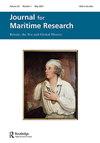The maritime history of Cornwall
Q3 Arts and Humanities
引用次数: 0
Abstract
tanka in St. Petersburg. Here, he developed a model of a pile driving machine that, he claimed, would replace the need for three-quarters of the prevailing labour force (123). However, we know very little about the machine or its future trajectory. In the rush to trace the origins of modern science to an eighteenth century industrial enlightenment and knowledge economy the shop floor and lived experience gets lost. We thus need to know a great deal more about Samuel’s interactions at the everyday practical level before we can truly understand how his approach was forged. Samuel was, primarily, a practical man with a deep interest in the materials used in the production of ships; this is further reflected in the particular manufactures he tried to develop while in Russia. Moreover we need to know much more about Samuel’s encounter and understanding of labour customs and legal regulations in both Russia and Britain to grasp the purpose of the managerial system he created (see, especially, Alessandro Stanziani, ‘The traveling panopticon: labor institutions and labor practices in Russia and Britain in the eighteenth and nineteenth centuries’, Comparative Studies in Society and History 51, no. 4 (October 2009)). This book, however, is a very useful contribution to furthering our understanding of both Samuel and contemporary approaches to the military-industrial complex.康沃尔的航海史
在圣彼得堡的探戈。在这里,他开发了一种打桩机的模型,他声称这种机器将取代目前四分之三的劳动力。然而,我们对这台机器及其未来的轨迹知之甚少。在急于将现代科学的起源追溯到18世纪的工业启蒙和知识经济的过程中,车间和生活经验被遗忘了。因此,在我们真正理解他的方法是如何形成的之前,我们需要更多地了解塞缪尔在日常实践层面的互动。塞缪尔首先是一个注重实际的人,对制造船只所用的材料有着浓厚的兴趣;这进一步反映在他在俄罗斯期间试图发展的特殊制造业上。此外,我们需要更多地了解塞缪尔对俄罗斯和英国劳工习俗和法律法规的遭遇和理解,以掌握他所创建的管理制度的目的(特别是亚历山德罗·斯坦齐亚尼,“旅行的全景监狱:18世纪和19世纪俄罗斯和英国的劳工制度和劳动实践”,社会与历史比较研究51,第2期。(2009年10月)。然而,这本书是一个非常有用的贡献,促进我们对塞缪尔和当代军事工业综合体的理解。
本文章由计算机程序翻译,如有差异,请以英文原文为准。
求助全文
约1分钟内获得全文
求助全文
来源期刊

Journal for Maritime Research
Arts and Humanities-History
自引率
0.00%
发文量
0
期刊介绍:
The Journal for Maritime Research ( JMR ), established by the National Maritime Museum in 1999, focuses on historical enquiry at the intersections of maritime, British and global history. It champions a wide spectrum of innovative research on the maritime past. While the Journal has a particular focus on the British experience, it positions this within broad oceanic and international contexts, encouraging comparative perspectives and interdisciplinary approaches. The journal publishes research essays and reviews around 15-20 new books each year across a broad spectrum of maritime history. All research articles published in this journal undergo rigorous peer review, involving initial editor screening and independent assessment, normally by two anonymous referees.
 求助内容:
求助内容: 应助结果提醒方式:
应助结果提醒方式:


